Many people use an aloe vera cream because its great for your skin and it can fight oxidative damage, help build collagen, and possibly even treat type 2 diabetes.
It’s not just for use after a bad sunburn.
Read on if you want to find out about the best aloe vera supplements on the market right now.
1. NOW Aloe Vera Gels
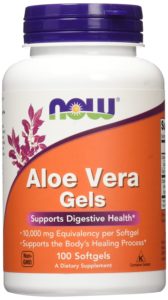
Click here for the lowest price on Amazon
If you are looking for an easy and inexpensive solution for taking aloe vera, NOW Aloe Vera Gels are your best bet. They are inexpensive, pure, popular, and come in a capsule that delivers 50 mg of aloe vera gel.
According to the company, because of how the concentration and extraction process works, this is equivalent to 10 grams of pure aloe vera gel. The aloe vera gel is dissolved in olive oil and is delivered via a gelatin capsule–this does mean that vegans are out of luck with this product, but there are plenty of other non-animal product options out there.
2. George’s “Always Active” Aloe
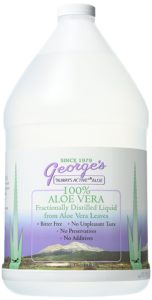
Click here for the lowest price on Amazon
If you want to cut out the middleman, or use your aloe vera for a multitude of purposes, the only way to go is with a large jug of liquid, and George’s brand is the cream of the crop. The imposing one-gallon jug contains dozens of servings of distilled aloe vera juice.
Aloe vera liquid is the only ingredient, and the jug is labeled for nutritional use, so you can be sure it’s pure enough to drink as well as to rub on your skin or to incorporate into your own homemade cosmetic products.
3. Herbal Secrets Aloe Vera
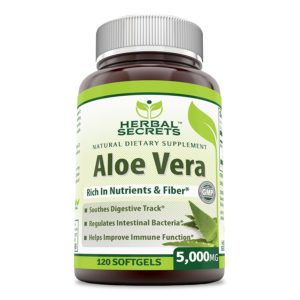
Click here for the lowest price on Amazon
Herbal Secrets serves up a respectable amount of aloe vera in a simple gelatin and oil capsule. Each capsule contains the equivalent of 5 grams of aloe vera gel: the manufacturing process involves concentrating the gel by a factor of 200, leaving 25 mg of the concentrate per capsule.
It’s a very solid product but for cost and content reasons, it doesn’t quite reach the top. The amount of aloe vera gel could be a little higher, and it doesn’t quite make it to the top in terms of cost-effectiveness either. That being said, it’s a perfectly reasonable choice.
4. Dynamic Health Labs Organic Aloe Vera Juice
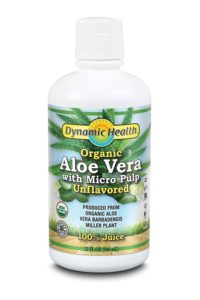
Click here for the lowest price on Amazon
Dynamic Health Labs focuses on offering a highly pure, well-tested aloe vera juice. This premium product comes at a higher cost, of course, but if you prioritize having organic ingredients, it’s a fantastic choice.
The sole ingredient is organic aloe vera juice, and Dynamic Health Labs contracts with an independent laboratory for purity testing. If you want to be absolutely sure about what you are putting in your body, there’s no other way to go.
5. NutriWorth Organic Aloe Vera Gels
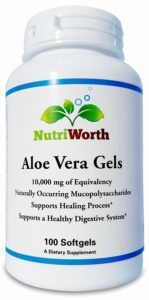
Click here for the lowest price on Amazon
NutriWorth makes a pretty legit aloe vera gel supplement. Each gelatin capsule delivers 50 mg of 200:1 organic aloe vera gel concentrate, and it’s dissolved in organic olive oil to boot.
You will have to pay extra for the privilege of having organic ingredients, but that’s always how it goes. It costs more money to produce, so it’s going to cost more money for you to buy it. But for an organic capsule-based aloe vera solution, NutriWorth can’t be beat.
6. Nature’s Way Aloe Vera Leaf Juice
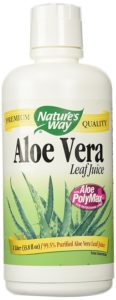
Click here for the lowest price on Amazon
The main selling point of Nature’s Way Aloe Vera Leaf Juice is its trademarked “PolyMax” polysaccharide extract that is included along with the usual aloe vera juice.
This, plus the preservatives and stabilizers, make this product substantially more expensive than other liquid-based options, so you’ll have to decide whether the polysaccharide extract is worth it for you. The health benefits of that compound are not as well researched as those of the aloe vera leaf, so it’s up to you to make the call.
7. Puritan’s Pride Aloe Vera Gel
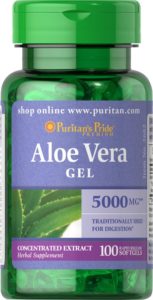
Click here for the lowest price on Amazon
Puritan’s Pride is another aloe vera gel concentrate supplement that uses a 200 to one concentration process. Each capsule of Puritan’s Pride provides 25 mg of concentrate, or 5 grams of original gel if you do the math.
It’s a little less cost-effective, and it does contain soybean oil, which is a cheaper solvent and may cause issues for people with soy sensitivities, but beyond this, it’s hard to find too much fault in Puritan’s Pride.
8. Herbalife Herbal Aloe Concentrate

Click here for the lowest price on Amazon
Herbalife, the massive multilevel marketing company, has made a fortune off their herbal aloe concentrate, as it’s one of their flagship products. Believe it or not, you can order it off the open market without having to directly go through a member. Unfortunately, it’s a little tricky to tease apart how much aloe vera is actually in this supplement, because it’s marketed as a drink, and as such just has a nutrition label.
For the same reason, it also has several non-aloe vera ingredients. It’s flavored and sweetened with sucralose (an artificial sweetener), mango flavoring, and citric acid, so you will be paying a lot more per serving than a typical aloe vera gel. Herbalife’s aloe vera product pushes into “lifestyle drink” territory, so in terms of its actual utility as a supplement, it scores somewhat low.
9. Just Javik Organic Aloe Vera Powder
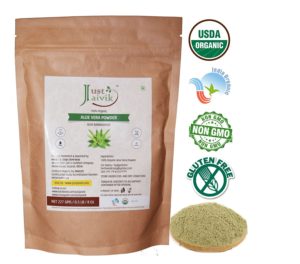
Click here for the lowest price on Amazon
This is another option for the do it yourself-er. Just Javik makes the interesting choice of offering a powdered version of aloe vera. Instead of juicing the leaves and selling the concentrate, Just Javik instead allows the aloe vera leaves to dry, then crushes them into a powder.
Having the powder is advantageous in some respects, as it allows you to gain the benefits of the phytonutrients in the leaf fiber. There is one big drawback though: it’s not edible. You wouldn’t want to eat it anyways, because of the fiber content. So, this one is great for cosmetics, but not for oral supplementation.
10. Lily of the Desert Aloe Vera Gelly
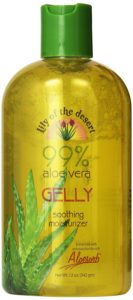
Click here for the lowest price on Amazon
Now, even though this one is listed as a “supplement,” it’s clearly not designed for internal use! Lily of the Desert is strictly a cosmetic product, which is not to detract from its uses. It’s got thickeners, stabilizers, and several skin-nourishing ingredients.
But you pay extra for this, and the fact that you can’t double-dip and drink it as well is actually a pretty important point to make. With the bulk aloe vera gels, you can use them for both external and internal use.
Part Two: Aloe vera overview
Aloe vera is a succulent plant known for its medicinal uses, especially in relation to skin health; the fluid stored in its long, spiky leaves is loaded with bioactive compounds delivering a range of benefits.
This versatile substance is valued by industries marketing food, cosmetics and pharmaceutical products globally to the tune of an estimated $13 billion in sales each year. (1)
Perhaps one of the most widely used medicinal plants, aloe vera grows best in dry climates where seasonal temperatures remain above freezing year round, thriving in sandy soil. It is also easy to grow indoors.
Let’s take a look at the reasons behind aloe vera’s popularity, along with ways you can incorporate this trusted natural remedy in your health plan.
Benefits
The thick leaves of the aloe vera plant, which usually grow between a foot and two feet in length, contain a slimy, thick gel containing most of the active compounds. This includes amino acids, vitamins, minerals and antioxidants.
The antioxidants in aloe vera belong to the polyphenol family, and can help satisfy the body’s need for these important substances.
Antioxidants perform the vital role of neutralizing free radicals in the system; a constant intake of these compounds can contribute to maintaining the proper balance between antioxidants and free radicals to keep our physical engines running smoothly. (2)
The antibacterial properties of aloe vera also make it useful in controlling the growth of harmful bacteria.
Aloe vera may be best known for its value in treating burns, and was first approved by the FDA for topical use in 1959.
It’s helpful in healing sunburn as well as first- and second-degree burns resulting from accidents and injuries.
The leaves can be sliced open and applied directly to affected areas; one strategy is to tape an opened leaf onto a small burn or wound with the gel facing down.
A review of data from four separate studies on the efficacy of aloe vera in treating burns showed an average reduction of 9 full days on healing time compared to results from using conventional medication. (3)
While studies have been conducted in an effort to determine how aloe vera performs when used to treat other types of wounds, evidence was inconclusive. (4)
As a topical application to healthy skin, aloe vera helps boost collagen production. The body’s ability to manufacture this substance decreases with age, and skin elasticity depends on this process.
When 30 women over 45 years old applied aloe vera gel to skin over a three-month period, collagen levels increased. (5)
While the use of aloe vera can reduce skin redness, it may also dehydrate skin cells; (6) it has not been shown effective for reducing radiation dermatitis or healing psoriasis. (7)
Aloe vera is a common ingredient in many skin care products, as well as preparations designed to provide relief for sun exposure.
Some believe the respectable levels of vitamin B, C, and E found in aloe vera gel are helpful for improving skin health, and when taken internally, it may provide moisturizing activity that works its magic from the inside out. (8)
Aloe vera can also help improve oral health. Ulcers in the mouth, usually called canker sores, are a common health problem many people experience during stressful times in their lives.
These painful and unsightly sores form on the inside of the mouth, as well as on or near the lips; it generally takes between 7 and 10 days for the sores to heal.
When test subjects in a study with nearly 200 people who suffered from repeated outbreaks of canker sores applied aloe vera patches to the affected area, sores were smaller than usual, but healing did not occur faster than with corticosteroids used in conventional treatment. (9)
However, another study indicated aloe vera not only speeded up the healing process, but also reduced the amount of pain participants experienced from the ulcers. (10)
Another widespread health issue aloe vera has been used to treat is controlling plaque build-up in the mouth. When bacterial biofilms build up on the teeth, the incidence of gum disease and tooth decay increase.
Chlorhexidrine is the active ingredient often used in mouthwashes to reduce oral plaque accumulation; during a short trial lasting 4 days, the effects of aloe vera juice in controlling plaque for a group of 300 healthy people were measured against conventional products, with comparable performance results. (11)
When other test subjects used aloe vera juice as an oral rinse over 2- and 4-week periods, similar results were noted. (12)
Through killing both streptococcus mucans (a bacteria that promotes the formation of plaque) and candida albicans (a yeast that can cause various health issues when overgrowth becomes a problem), aloe vera can be helpful in maintaining better oral health. (13)
The sticky gel inside aloe vera leaves has been traditionally used as a remedy for diabetes. In some cases, it has been found effective in regulating blood sugar and improving insulin sensitivity. (14)
Studies conducted with humans and animals show encouraging results when subjects consumed aloe vera for treating type 2 diabetes. (15, 16, 17)
Side Effects
Some trials indicate liver function may be negatively impacted by long-term use of aloe vera juice taken internally. (18)
Information from more trials are necessary to determine the efficacy of aloe vera in managing symptoms of diabetes.
Aloe vera has also been used successfully to treat constipation. Just beneath the prickly outer skin is a layer containing a yellowish substance called latex. The latex is rich in barbaloin.
Aloin present in the barbaloin is known for its laxative effects. (19, 20, 21) Aloe vera juice outperformed pharmaceutical laxatives in a study of 28 healthy adults with constipation issues. (22)
Concerns about the safety of aloin when used frequently as a laxative resulted in discontinuation of aloe vera latex as an over-the-counter remedy in 2002.
Despite what you may have heard, there is no evidence that aloe vera can be helpful in addressing other digestive tract disorders, including inflammatory bowel disease (IBD) or irritable bowel syndrome (IBS). (23, 24)
Summary: Aloe vera provides a natural option for treating skin issues, improving oral health, bumping up antioxidant intake, and may also help in regulating blood sugar.
https://bodynutrition.org/aloe-vera/ http://bodynutritionorg.tumblr.com/post/164602612064
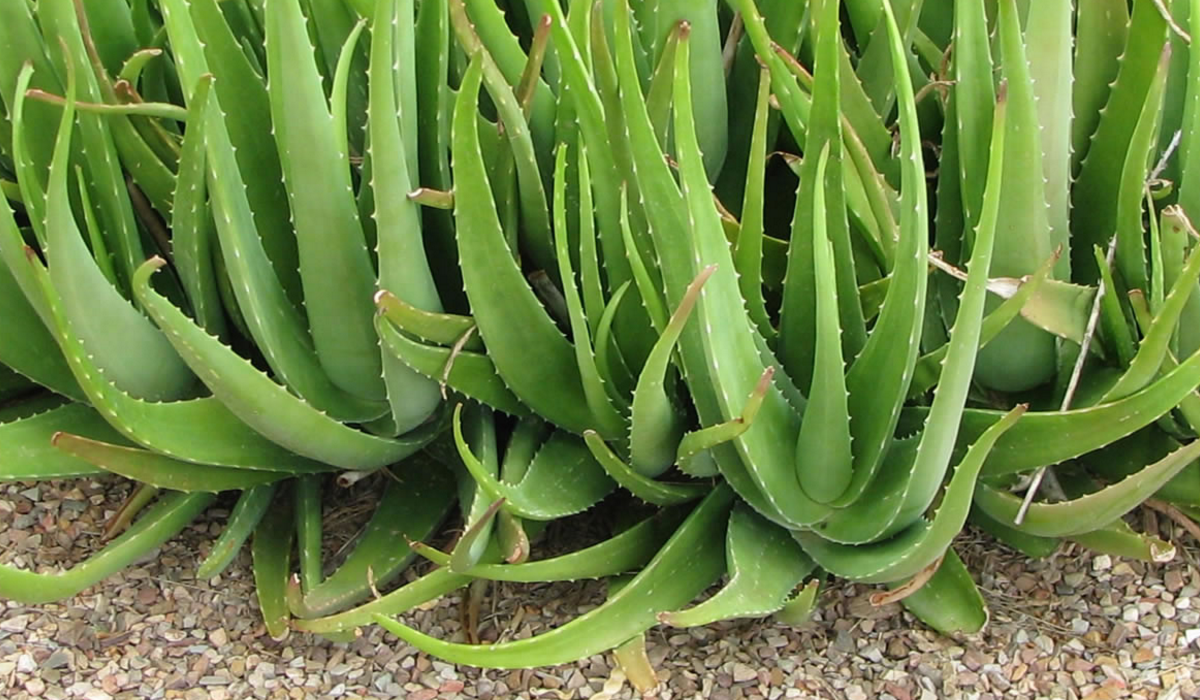
No comments:
Post a Comment